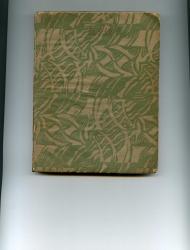
Autograph account by Frederick Leman Whelan of a visit by him to the Soviet Union in 1936, as leader of 'the League of Nations Union party' of British 'useful idiots'; with other matter relating to the U.S.S.R.
Small 4to, 61 pp, with the first four pages unpaginated and the last ones paginated 1-57. In notebook of good laid paper, in decorative boards. Text clear and complete. Very good, on lightly-aged paper; in worn and chipped wraps, with 'U.S.S.R.' on spine and front board. Various addresses by Whelan inside the front cover, with the date 1936 amended to 1945 and 1950. Pages of slogans and abbreviations are followed by the notebook itself. The volume intersperses notes on the visit (ending at p.31) with extracts of quotations, statistics and other matter about the Soviet Union. The first entry, dated 22 June 1936, gives the names and details of the eleven members of 'the party to U.S.S.R.', with Whelan naming himself 'Leader of the party'. The group includes the artist Priscilla Thorneycroft, the Rev. Henry Iselin, and Councillor Arnold Kenyon of Ashton under Lyne ('Interested in Industrial & Social Con.'). 'We leave Hayes Wharf, London Bridge, by M. V. Sortongflot (Soviet Mercantile Fleet) on Sat. 27th June and are due back at Hayes Wharf on Sunday. 19th July'. Whelen's first impressions of the ship are 'very favourable'. 'The crew and the officials seem very pleasant.' Three days later the ship enters the Kiel canal: 'Propaganda is entirely absent. There is not even a picture visible of either Lenin or Stalin. The only books seem to be those brought on board by the passengers. The boat is scrupulously clean. The sailors seem to spend their leisure scrubbing the decks or polishing where polishing is possible or washing steps and windows. An atmosphere of complete friendliness.' Whelen transcribes a number of 'appreciations' in 'The Traveller's Book in the Salon of the "Cooperazia"', noting that 'Among them a large number of American travellers express extreme indignation at Hearst's accusations of starvation in Soviet Russia.' After a journey of five days the party arrive in Leningrad, which strikes Whelen as 'a happy, orderly, and cheerful city. I saw very few soldiers. The police, or militia, or whatever is the correct name, seemed friendly with the people. [...] Little boys frequently asked for stamps. Boys and older people also joined up with us at the least encouragement and talked and showed us the way. I was surprised at the number who spoke German.' He finds the female 'Guides of "Intourist" 'charming and competent. They descibe things with great clarity. No obvious propaganda.' On 9 July the party are in Moscow, where one of their first visits is to the 'Commune for Derelict Boys': 'Later girls were included. One of the first waif boys married a girl in the Village and is now Director of the Boot Factory. The boys at first objected to girls being received. As the Director put it "The criminals refused to receive the prostitutes". Started 12 years ago'. In later entries others join the party (on one tour they are joined by the American playwright Elmer Rice). Whelen gives a long account of a 'Talk with A. Neyman, Director, Third Western Department' at the People's Commisariat of Foreign Affairs in Narkomindel. On 11 July they go to 'VOKS', where they are 'received by AMDOR of the Anglo American Dept. by Mrs. Kislova and Miss Plakshina, our interpreter, who had accompanied us'. He describes 'the Propaganda Film "Cirkus"'. Long description of conversation with 'Mr. AROSEV, the President of Voks'. The party's 'last combined excursion and one of the most delightful' is a journey 'by car a few miles out of Moscow to the Malablovsky Children's Village in the pine woods'. Description of village and conversation with children. 'When we left they crowded round our car shout "Good bye" which they had just proudly learnt from us. We gave them 3 cheers and they vigorously imitated us. I was presented with a bouquet of flowers, a new experience for me. Oh! the Russian country roads'. Of Andre Gide Whelen writes: 'I met Gide at Leningrad. He was with a group of French authors. He had been in Moscow for the Funeral of Gorki on 20. 6. 36 and had given an address in the Red Square'.


